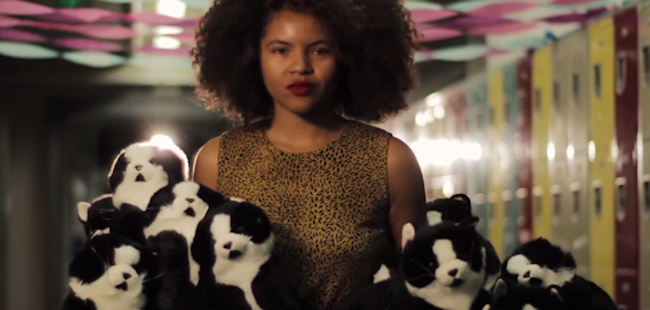Street harassment is a daily reality for many women and LGBTQ individuals, however it skyrocketed to the spotlight earlier this year when a video commissioned by group Hollaback claimed to document over a hundred separate instances of street harassment as experienced by a woman as she walked the streets of New York City for ten hours while being recorded by hidden camera. That video sparked a national conversation on street harassment — what it is and why it is damaging — but the video was also criticized for its clumsy treatment of race: the woman in the video appears visibly White while nearly every documented harassment is committed by a man of colour. Hollaback has been accused of subtly reinforcing anti-Black stereotypes through shoddy methodology and selective editing: most of the examples ultimately included in the video were recorded in Harlem. Hollaback responded:
Hollaback! understands that harassment is a broad problem committed by a broad spectrum of individuals across lines of race, location and class. We know from the 8,000 stories we’ve collected on ihollaback.org that there is no single profile for a harasser, and harassment comes in many different forms. We are deeply invested in a movement that is multiracial, gender inclusive and incorporates place-based leadership specific to each locale.
But, to paraphrase Ta-Nehisi Coates, do we really want people of colour rendered by the same hand that failed to see the problematic racial dynamics of the initial video? “Invisibility is bad,” Coates says, “caricature is worse.”
That’s why I fully support this project by imMEDIAte Justice (@imMEDIAteFilms), a WOC-run organization that hopes to specifically empower WOC and LGBTQ individuals to tell our own stories regarding street harassment.
Earlier this year, imMEDIAte Justice encouraged a multiracial group of teenagers to express themselves regarding street harassment, racial profiling and homophobia which culminated in the above 1-minute video parodying Lil Jon’s “Turn Out For What” with a hundred stuffed cats. (I really want to know what happened to all the cats after the shooting of this video. I hope they found good homes.)
ImMEDIAte Justice engaged the teens and focused their energies by inviting in Hollywood professionals to help create the student film, including The Daniels (director of the original “Turn Out For What” music video), singer Hollis (who collaborated with Macklemore in “White Walls“) and musician Yazmin Monet Williams. Feministing reports:
The girls learned that their experiences were not unique but social as everyone had an experience to contribute. Under the leadership of Tani Ikeda, ImMEDIAte Justice’s founder, the girls collaborated on a story that would be inspiring and hopeful. “It was incredible to see how the process of making the ‘Catcall for What?!’ music video transformed a painful experience we’ve all faced into something that gave us agency,” Ikeda said.
Ikeda, who is the Executive Director of imMEDIAte Justice, is also an awesome artist in her own right; she recently directed this amazing music video for “Dum Ditty Dumb” by Crystal Kay, which I loved when it first launched but didn’t post about on this blog because I suck. Pause for intermission now and watch this awesome video. Then, I promise it’s back to your regularly scheduled discussion of intersectional identity politics.
Ridiculously cool, right?
Anyways, the ladies of imMEDIAte Justice have made a ton of other cool videos, many focused on WOC identity, and are now looking for your help to help keep the company running, and inspiring teenaged girls to explore their feminism and challenge street harassment. The group has created an IndieGOGO campaign, and are hoping to raise $5,000 to help fund their video series, which they hope will center young women of colour and LGBTQ voices.
imMEDIAte Justice writes:
Why Is It Important To Create This Video Series?
1) It centers young women.
Adolescent girls are often harassed, because men are attracted to their youth. This also makes them incredibly vulnerable to predators. If we want to combat catcalling, we have to give visibility to everyone who is affected by it—especially young girls and women. If they are the individuals most affected by it, then they should be the individuals included in the conversation on how to end it.
2) It centers people of color.
Women of color from all backgrounds often speak on being “exoticized” by men when being catcalled and harassed. This is a form of oppression that objectifies women at the intersection of race and gender. But street harassment is not always about sexualizing the victim. It can also include comments on race, ethnicity, age, ability, and other types of identities.
So please, take a minute to donate just $25 or more to imMEDIAte Justice’s IndieGoGo campaign, and help fill the world with more cats, and less catcalls.

